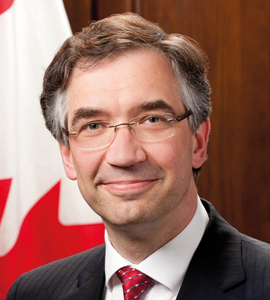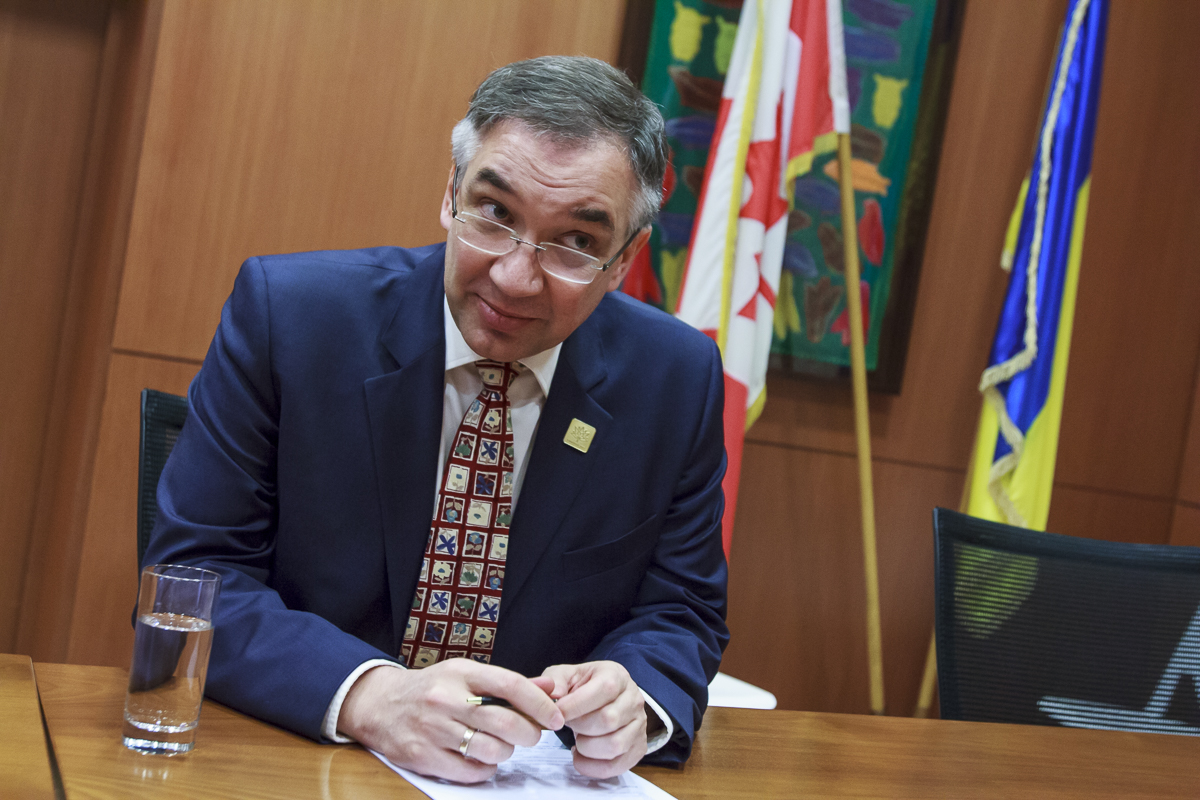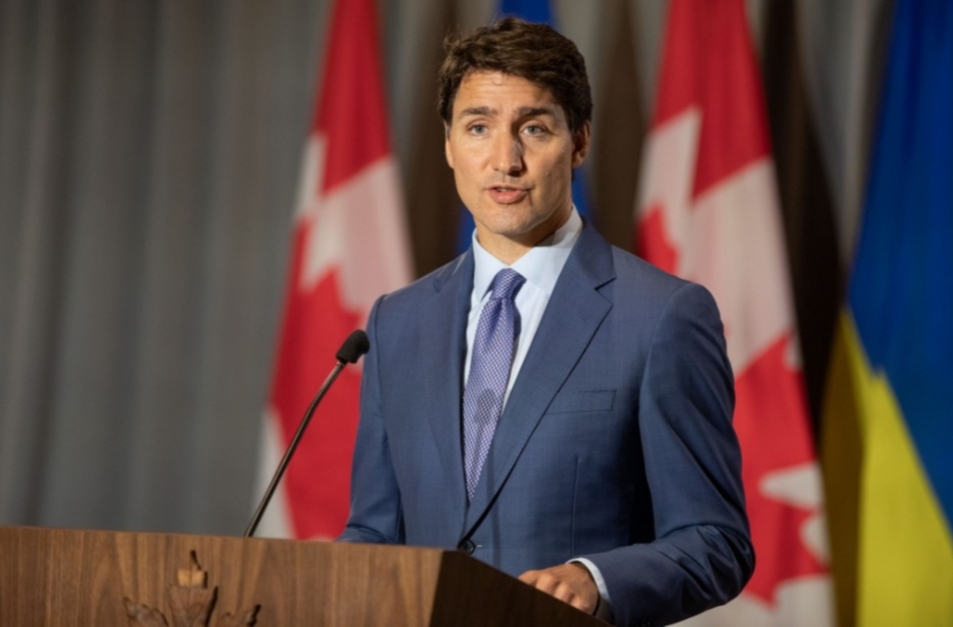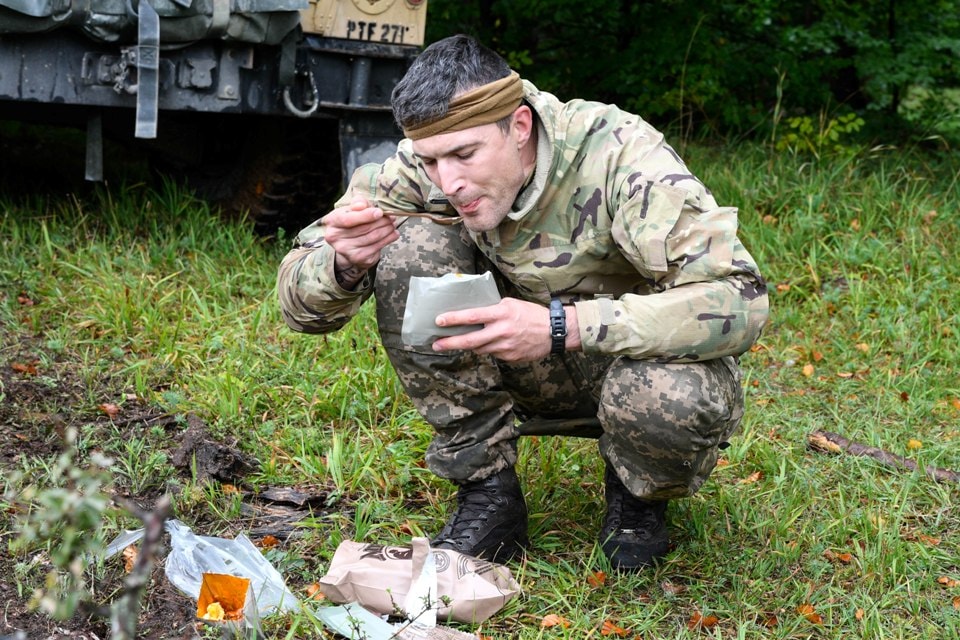Praising the success Ukraine has achieved since 2014, he was also sincere in defining the “top 10 mistakes” and explained what could and still should be done. His lecture turned into a comprehensive summary and self-critique of the last six years that went viral among Ukrainian changemakers.
Euromaidan Press believes this summary of 10 points from Waschuk’s lecture is worth reading for anybody caring about reforms in Ukraine.

“Western people often think that they understand everything about Ukraine... I do not rule out that the main сause of Ukraine's mistakes and problems is the ‘merit’ of Ukrainians themselves... But we all contributed a little to the mistakes of 2014-19, and I want to talk about that,” - began Waschuk, addressing western donors and top Ukrainian reform makers both from political and NGO spheres.
Waschuk's main point is that Ukraine is a very complicated country. Neither Kyivan elites, nor Moscow enemies or especially remote western friends understand it in full. That is why reform makers did not achieve their desired result, while Putin’s offensive in 2014 failed close to the Ukrainian border, far from the Kremlin-claimed half of Ukraine.
Yet since 1990, Ukrainians have already had three revolutions, of which the Revolution of Dignity was the latest. This turbulence means that something is wrong with the self-awareness of the entire country.
№1. Reform-bolshevism: if it is not 105% successful, then it failed
“‘Treason’ is almost a meme of Ukrainian life, as well as victory, shame, and other similar emotions. I saw such an exalted belief [after the Revolution of Dignity] that everything can be changed, turned upside down, transformed, and Western countries have signed under this program of the maximum.”
The danger lies in the fact that when Ukrainians reach 80%, they continue talking only about 20% of what failed.
It demotivates people and gives the impression that there are no achievements. Compare what some publicists are writing now. For example, Serhiy Fursa was a great critic of Poroshenko - both in the magazine Novoe Vremia and in social networks. Now he talks about the good old days, when there were still reforms. Well, Serhiy, did someone replace you in those years when you found nothing that was perfect?
№2. Two equally important wars against Russia and corruption. But Russia ≠ corruption
Many ambassadors to Ukraine say that Ukrainians have two wars — against Russia and against corruption. But that was the wrong message.
"Because all sorts of internal troubles of the state can be leveled over time, but if you lose the war with an external enemy, then all other discussions become theoretical, and you hold them either in a concentration camp or in exile."
It was not possible to mobilize all state efforts for the war and at the same time destabilize the state internally while fighting corruption. For anti-corruption policy required a painful and resource-consuming inner reorganization.
"Emphasizing the equivalence of these two threats meant that the West suddenly said that unless Ukraine became a shining example of all the best in human life, it did not deserve to be defended. For example, Bangladesh, or Belgium, or Ethiopia have the right to exist regardless of their Transparency International rating, but Ukraine must earn the right to be supported and defended by someone."
Waschuk recommended the Canadian slogan of domestic policy, but applied to Ukraine: "Peace, order and maybe good government."
№3. Anti-corruption above all! Even above the rule of law
“In Ukraine with relatively weak institutions, personal horizontal and vertical connections are a common way for almost everyone to resolve issues. So, if you have launched a large uncompromising anti-corruption campaign, then almost everyone in Ukraine falls under its influence. In Ukraine, as the then Secretary of the National Security Council said about the first stage of mobilization in the Ukrainian defense industry, 'there was no corruption in the system, the system was corruption, and we used it to get the defense going.’”

Such a radical approach with the creation of comprehensive anti-corruption infrastructure was a mistake since it requested honesty from all Ukrainians at once but at the same time made unusually transparent all crimes of the elites.
Waschuk referred to the experience of Guatemala, where the radical and partially successful fight against corruption resulted in the election as president Jimmy Morales in 2015 – a comedian with no political experience. He was finally used by local business elites to destroy the entire anti-corruption system.
“A more balanced and selective approach would probably be more successful. Wider rule of law reforms are not as spectacular as arresting someone and unfolding banknotes in front of a camera, but they could do better in the long run.”
№4. Let's go help the marginalized! Leaving behind unnoticed ordinary Ukrainians
“Western governments want to save marginalized people. There were indeed problems in Ukraine: the war in the East, internally displaced persons, the problems of LGBT people, the problems of the women's movement, the problems of the Roma population, the problems of people with disabilities. And for all of them, we had programs, projects, we worked and ticked our reports.
However, we somehow forgot about the majority of the population of Ukraine. It is currently less multicultural than you imagine. According to the polls, it is about 92% Ukrainian, about 6% Russian, the rest Poles, Jews, Roma and others. Residents of villages, smaller towns and district centers, which have long suffered from economic decline, felt forgotten in the period from 2014 to 2019. They were among those who volunteered to go to war, but they felt that Kyiv did not care about them.”
Waschuk claims that precisely this majority of Ukrainians voted against former authorities and their reforms at the last elections. The most common example are huge agricultural companies, developing well in Ukraine and contributing to exports, making for good macrofinancial stability in IMF reports. At the same time, such companies require only one worker for John Deere (agricultural machine) and the rest of the village has no work and must seek it in Poland. There were no programs for these and many other groups of people.
№5. The dead infographic or communication without a heart
“Millions of infographics of various complexity were published, but they lacked soul, emotions, there was no positive reformist narrative, what we do, why and what you will get out of this. There were a lot of images of all the technical steps – normal people turn off when they see this, and do not care, but listen to the emotional narrative. And the latter came mainly from opponents of both reforms and Ukraine, who played on emotions, not on technocratic schemes.”
We see this not only in Ukraine. The common thing is that people hear different things, from different sources – they mix in their heads. If someone has given an emotional explanation then voting goes with it. The problem was that all reform makers failed to help the government and president with the creation of emotional narrative about all successes.
№6. An avalanche of foreign requirements and visits, overload by reports
"If the mayor has been wandering around Canada for two weeks and gaining experience elsewhere, then he did not run the city this time, did not make reforms. Again, we need to find a balance here, but I think that so many resources have been invested in Ukraine in the last 5 years that we may have overcarry with various activities… Canadian requirements differ from American, Japanese, Italian, European. So the government and NGOs had to hire special staff to fill out all those reports to continue receiving assistance."
№7. Сarefully and slowly. But immediate support pays off twofold
“There were situations when the Ukrainian side said: ‘We need to move and do something already.’ But the West said, ‘Wow-wow-wow, wait, wait. We have a procedure, we have an annual budget. Let's do it in two or three years.’”
But the windows of opportunity provided by radical political change do not remain open forever, they close. And a large part of the western support had little effect just because it was too late. When the EU finally started the "Ukraine Reform Architecture'' program in 2017, aimed to financially support new top-managers in the government, the window of opportunity was already closed. More qualified people came to the government, but everyone already started thinking about the 2019 elections.

“I will give a specific example. When Natalia Yaresko was appointed Minister of Finance (it was November-early December 2014), she called me on the second day and said: ‘Roman, I'm here in the ministry, no one here knows how politics is formed, they just all know how to count, and no one here wants to think strategically. What should I do about this?’ I then turned to Scott Clark, a former Deputy Minister of Finance of Canada and then our representative at the IMF, and to Paul Migus, who had rebuilt many Canadian or Australian management systems. Six days later, they flew to Kyiv, sat down with Natalia Yaresko and her chief of staff Oksana Markarova and in two weeks drew a picture of how at least the highest level of the Ministry of Finance should work. As for the help of other countries, Natalia told me that they had been waiting for another six months to agree on how to provide a consultant.”
№8. Сomplicated management experiments in a "lab animal" country
If some public administration specialists were not allowed to implement something at home, they used to come to Ukraine and implement their new brilliant ideas here.
However, not everything went well all the time. Ukrainians needed, first of all, simple and proven management solutions. The system of e-declaration of income is the best example. Initially, only top officials had to fill them out. Yet some experts from the World Bank and activists proposed expanding its scope. Finally, we have 1.2 million officials, including some state drivers, who have to submit declarations. This creates a mess which is not effective.
“It takes a few days to fill approximately 60 pages of data. Describe everything, including what pictures you have at home, how much jewelry your wife has, how many watches your husband has and what firm. Apparently, most of the people who filled it hated the system and the people who demanded it… Anyone with the Internet can view the declarations of almost every Ukrainian official. You can use this in your election campaign, to say that his mother-in-law has a garage, but he entered it incorrectly, and you can make a big deal out of that mother-in-law's garage, which becomes more important than Kolomoyskyi’s 5.5 billion, which he took out of Privatbank. Everyone understands about the garage, and billions – that's something abstract.”
№9. Mirages of deliverology: projects do not reach their political addressee
“Volodymyr Hroysman [prime minister, 2016-2019] is a very systematic, pragmatic person. He thought, if we build for people X kilometers of roads, organize the supply of X number of free medicines for seniors, everyone will appreciate it, and accordingly there will be an election result. But he failed to link this to the national narrative of decentralization. Suddenly it turned out that everyone loves their mayor, who makes their road and restores the park. And Kyiv means 'some people who launder money and do something abstract', although it was Kyiv that handed over all this money to the municipalities.”
According to a survey, the majority of Ukrainians were satisfied with how their municipality has developed over the last years. Yet, they failed to associate this with national policy, thinking that the country was heading into an abyss. That was the mistake of communication.
№10. Focusing on secondary risks. IMF and how the gas price “burned” the government.
“The IMF focused on the issue of gas prices in Ukraine and decided that the government should raise it. The government warned that this would be the end of their political story. But the IMF and economists said: ‘No, look, we will give people a subsidy, no one will suffer, we just want to reach absolute transparency in everything.’
But under Ukrainian conditions, people see the price of gas and are already offended, they forget, they forget that they have subsidies. And when they apply for a subsidy, opposition politicians tell them: ‘This is a sign that you are poor, you can't even pay for gas, the state has to give you some handouts.’ What seemed logical in the calculations was deadly in Ukrainian political realities.”
Bottom line
Summarizing what should have been done differently, Waschuk said that he would not pass the issues of communication to British or other western specialists. They may be good communicators in London, but the task required people who understand Ukraine well. It was important to deliver messages through storytelling, specific examples of how people’s life has improved.
"The government after the Maidan in Ukraine until 2019 did things which were unpopular among ordinary people. They were popular in Washington, in the Ministry of Finance in Ottawa, but not in Khrystynivka or Melitopol. What has healed the Ukrainian economy from our Western point of view has often been perceived in Ukraine as one catastrophe after another, and dissatisfaction with politicians was fueled by the losers – the oligarchs who own the main TV channels."
Speaking ahead of local elections, Waschuk was surprisingly precise to predict their results correctly. Firstly, he noted, the majority of current mayors would be reelected.
“Take for example Hennadiy Kernes in Kharkiv. He does not have the best reputation for clean hands or a pro-Ukrainian position, but he is a pragmatic man and is extremely good at providing city services which are important to ordinary citizens: parks, roads, etc. In the summer of 2017, we drove through Kharkiv during one of the visits and saw how beautiful the city looked. The head of the Canadian delegation asked me: ‘Why are we helping this country if there are more flowers planted on the roads than in Canada?’ When I was in Kharkiv, I asked young engineers and other normal progressive people what they thought about the city leadership. They answered something like: ‘My wife is very happy with the park, playgrounds, benches, we are happy.’”
Waschuk also predicted the partial return of Opposition Platform in the south-eastern regions since “Medvedchuk and his ‘comrades’ have already gained enough informational weight to turn it into votes.”
He also mentioned the restoration of Poroshenko’s European Solidarity impact but noted that for Poroshenko a media image of a corrupt official was created and it is extremely hard for him to restore trust.
- Read also: Why eastern Ukraine continues to support pro-Russian politicians in the seventh year of war
The problem, according to Waschuk, is that new political forces and parties are mixed-up and disunited. Therefore, currently they cannot present authoritative alternative politicians and a reasonable political agenda on the Ukrainian political landscape.
Read more:
- Constitutional Court torpedoes Ukraine’s anti-corruption reform
- (Anti-)Constitutional Court of Ukraine: why it declares the best reforms unconstitutional instead of protecting the Constitution
- Five steps for successful reforms and unification of Ukraine addressed at Re: Open Zakarpattia Forum
- Ukraine’s judicial reform stumbles with odd Constitutional Court rulings
- Decentralization — a true success story from Ukraine
- Ukraine breaks its duck with new election rules, and the results are heartening
- Seven years after Euromaidan: how much has Ukraine progressed?





